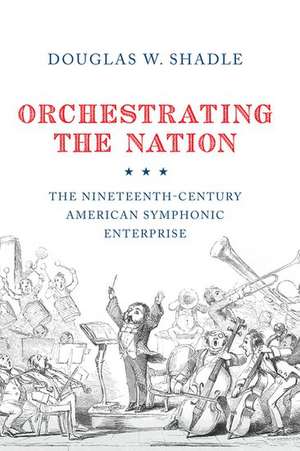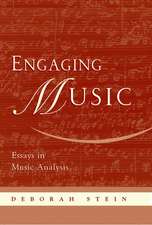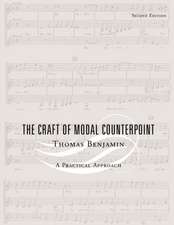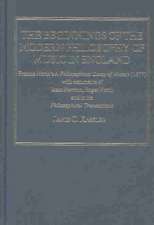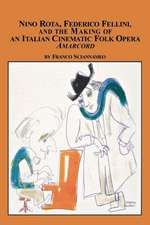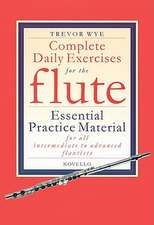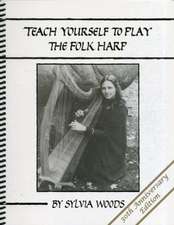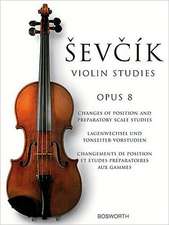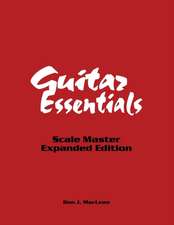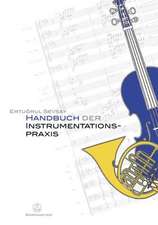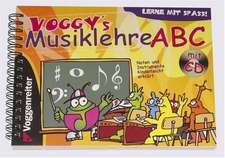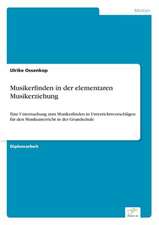Orchestrating the Nation: The Nineteenth-Century American Symphonic Enterprise
Autor Douglas Shadleen Limba Engleză Paperback – 26 sep 2018
| Toate formatele și edițiile | Preț | Express |
|---|---|---|
| Paperback (1) | 200.89 lei 10-16 zile | |
| Oxford University Press – 26 sep 2018 | 200.89 lei 10-16 zile | |
| Hardback (1) | 464.13 lei 31-37 zile | |
| Oxford University Press – 26 noi 2015 | 464.13 lei 31-37 zile |
Preț: 200.89 lei
Preț vechi: 219.95 lei
-9% Nou
Puncte Express: 301
Preț estimativ în valută:
38.45€ • 39.99$ • 31.74£
38.45€ • 39.99$ • 31.74£
Carte disponibilă
Livrare economică 13-19 martie
Preluare comenzi: 021 569.72.76
Specificații
ISBN-13: 9780190914479
ISBN-10: 0190914475
Pagini: 344
Ilustrații: 9 halftones, 93 line
Dimensiuni: 231 x 155 x 23 mm
Greutate: 0.5 kg
Editura: Oxford University Press
Colecția OUP USA
Locul publicării:New York, United States
ISBN-10: 0190914475
Pagini: 344
Ilustrații: 9 halftones, 93 line
Dimensiuni: 231 x 155 x 23 mm
Greutate: 0.5 kg
Editura: Oxford University Press
Colecția OUP USA
Locul publicării:New York, United States
Recenzii
More than anything else, Orchestrating the Nation illuminates the origins and myriad strategies of the classical music world's eternal animus against American composers.
Absorbing.
Superb.
[Shadle] delves deeply into the forgotten history of symphonic composition by Americans born between 1777 and 1874...in his exhaustively researched text.
By the 19th century, an impressive body of American symphonic works had emerged; however, it has been only briefly covered in standard course texts on American music...Filling this obvious void, Shadle (Vanderbilt Univ.) provides an excellent, painstakingly detailed study of those American works, including musical examples, structural-narrative analyses, illustrations, and photographs of composers. He investigates why more recent American composers chose to write symphonic works that would be subjected to German-influenced criticism, what made them believe it was an enterprise worth pursuing, and the creative impulses behind these works. An invaluable resource for those studying the history of American concert music...Highly recommended.
Orchestrating the Nation contains much valuable new research. A broad spectrum of critical commentary, well beyond the reactionary Dwight, is presented, bringing into focus the competing agendas that emerged in the search for a national voice in music.
Shadle...provides a string of interesting portraits of individual American composers...and the impassioned debate their works engendered.
Shadle's Orchestrating the Nation unveils a significant chapter in music history in a form that is informative, engaging, and appealing to both scholars and music lovers. The author has convincingly brought the nineteenth-century American symphonic enterprise back into academia.
[A] praiseworthy contribution to music history...
Shadle has produced a book that is a delight to read, with discoveries on virtually every page and written in a style that impels the reader onward. The non-musician need not fear getting entangled in dense music analysis or running up against incomprehensible jargon: the author has a talent for the nontechnical description of musical processes...a most welcome addition to the core literature about music in nineteenth-century America.
Douglas W Shadle's pioneering Orchestrating the Nation charts the turbulent course of 'The Nineteenth-Century American Symphonic Enterprise' (as its subtitle has it) with scholarly detail and illuminating commentary. He estimates around 100 symphonies were produced by American-born or domiciled composers during the century. Initially derivative of their European counterparts, successive generations went to the land, to native folklore and to politics to source an authentic sound...With a companion website offering musical excerpts of works discussed, this is an invaluable introduction to a woefully neglected aspect of American music making.
Douglas W. Shadle's monograph Orchestrating the Nation: The Nineteenth-Century American Symphonic Enterprise is a major contribution to the scholarship of this time period. Taking as his subject a body of music that even late-nineteenth-century American critics refused to acknowledge, Shadle unearths, analyzes, and advocates for a repertoire that has been erased almost completely from the historical and performance record. Indeed, the manner of that forgetting is at the heart of this book as his topic is 'the very processes through which listeners confer value upon composers, pieces of music, and the act of composition itself.' (p. 3) ... Well written with a dry wit that enlivens the prose, Orchestrating the Nation is an important contribution to the study of the symphony in the nineteenth century.
This book is accessible to a variety of audiences. For a reader with limited or no knowledge of music notation, Shadle and Oxford University Press have put together a straightforward companion website that includes audio clips of the music discussed in each chapter. Shadle also includes and extensive list of American periodicals available digitally ... Shadle provides readers with an engaging introduction to a vast repertoire that is glossed over in music history texts, if mentioned at all, and entices the reader to enter in an aural representation of a developing national identity.
Shadle's prose is clear and elegant, with delightful turns of phrase. He makes his points neatly, and often seasoned with a clever yet incisive wit. In addition, his musical analyses, while necessarily brief but never superficial, similarly use language in a way that both describes and evokes the sounds of the music itself. In a word, Shadle's writing sings. The notated musical examples are gratifyingly accessible as recorded audio clips on the book's companion Web site.
Absorbing.
Superb.
[Shadle] delves deeply into the forgotten history of symphonic composition by Americans born between 1777 and 1874...in his exhaustively researched text.
By the 19th century, an impressive body of American symphonic works had emerged; however, it has been only briefly covered in standard course texts on American music...Filling this obvious void, Shadle (Vanderbilt Univ.) provides an excellent, painstakingly detailed study of those American works, including musical examples, structural-narrative analyses, illustrations, and photographs of composers. He investigates why more recent American composers chose to write symphonic works that would be subjected to German-influenced criticism, what made them believe it was an enterprise worth pursuing, and the creative impulses behind these works. An invaluable resource for those studying the history of American concert music...Highly recommended.
Orchestrating the Nation contains much valuable new research. A broad spectrum of critical commentary, well beyond the reactionary Dwight, is presented, bringing into focus the competing agendas that emerged in the search for a national voice in music.
Shadle...provides a string of interesting portraits of individual American composers...and the impassioned debate their works engendered.
Shadle's Orchestrating the Nation unveils a significant chapter in music history in a form that is informative, engaging, and appealing to both scholars and music lovers. The author has convincingly brought the nineteenth-century American symphonic enterprise back into academia.
[A] praiseworthy contribution to music history...
Shadle has produced a book that is a delight to read, with discoveries on virtually every page and written in a style that impels the reader onward. The non-musician need not fear getting entangled in dense music analysis or running up against incomprehensible jargon: the author has a talent for the nontechnical description of musical processes...a most welcome addition to the core literature about music in nineteenth-century America.
Douglas W Shadle's pioneering Orchestrating the Nation charts the turbulent course of 'The Nineteenth-Century American Symphonic Enterprise' (as its subtitle has it) with scholarly detail and illuminating commentary. He estimates around 100 symphonies were produced by American-born or domiciled composers during the century. Initially derivative of their European counterparts, successive generations went to the land, to native folklore and to politics to source an authentic sound...With a companion website offering musical excerpts of works discussed, this is an invaluable introduction to a woefully neglected aspect of American music making.
Douglas W. Shadle's monograph Orchestrating the Nation: The Nineteenth-Century American Symphonic Enterprise is a major contribution to the scholarship of this time period. Taking as his subject a body of music that even late-nineteenth-century American critics refused to acknowledge, Shadle unearths, analyzes, and advocates for a repertoire that has been erased almost completely from the historical and performance record. Indeed, the manner of that forgetting is at the heart of this book as his topic is 'the very processes through which listeners confer value upon composers, pieces of music, and the act of composition itself.' (p. 3) ... Well written with a dry wit that enlivens the prose, Orchestrating the Nation is an important contribution to the study of the symphony in the nineteenth century.
This book is accessible to a variety of audiences. For a reader with limited or no knowledge of music notation, Shadle and Oxford University Press have put together a straightforward companion website that includes audio clips of the music discussed in each chapter. Shadle also includes and extensive list of American periodicals available digitally ... Shadle provides readers with an engaging introduction to a vast repertoire that is glossed over in music history texts, if mentioned at all, and entices the reader to enter in an aural representation of a developing national identity.
Shadle's prose is clear and elegant, with delightful turns of phrase. He makes his points neatly, and often seasoned with a clever yet incisive wit. In addition, his musical analyses, while necessarily brief but never superficial, similarly use language in a way that both describes and evokes the sounds of the music itself. In a word, Shadle's writing sings. The notated musical examples are gratifyingly accessible as recorded audio clips on the book's companion Web site.
Notă biografică
Douglas W. Shadle is currently Assistant Professor of Musicology at Vanderbilt University's Blair School of Music. He holds a Ph.D. in musicology from the University of North Carolina at Chapel Hill.
